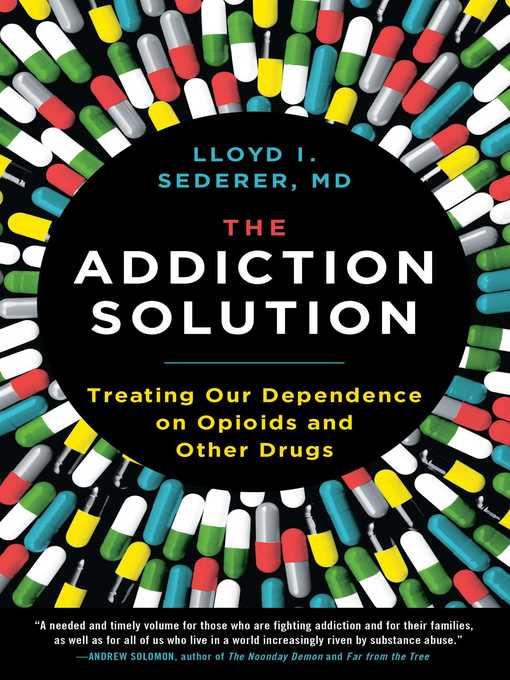
The Addiction Solution
Treating Our Dependence on Opioids and Other Drugs
کتاب های مرتبط
- اطلاعات
- نقد و بررسی
- دیدگاه کاربران
نقد و بررسی

January 8, 2018
Sederer, psychiatrist and New York State chief mental-health officer, elucidates the complexities of addiction in this scholarly and informative book. The information provided is weighty and acronyms abound, but plentiful human stories of addiction and recovery from the author’s practice and from popular culture—Billie Holiday (a heroin addict) and Bruce Springsteen (the son of an alcoholic) appear—lighten the impact of the profusion of facts. Part one begins with 10 factors, such as drug potency and purity and user age, that influence whether an individual will interact with a psychoactive substance as a “chipper”—an occasional, unaddicted user—or addict. Part two examines prevailing public-policy approaches for prevention, and part three looks at principles of treatment and summarizes the many kinds that can be effective. Sederer leaves his audience with the pragmatic understanding that addiction is a multifactorial disease and that its prevention and treatment require a comprehensive approach based on the individual’s circumstances and character traits. For readers interested in understanding current thought on addiction, prevention, and recovery, the book will prove invaluable.

March 15, 2018
An exploration of drug addiction and the various treatment options.In this slim but fairly comprehensive work, Sederer (Improving Mental Health: Four Secrets in Plain Sight, 2016, etc.), the chief medical officer for the New York State Office of Mental Health, aims to inform individuals, families, and communities of the complex issues surrounding drug abuse and addiction, whether the addiction involves prescription pain killers or recreational substances such as marijuana or cocaine. He also focuses on the far-ranging challenges of treatment options, how they can be influenced by physiological issues and often undermined by governmental policies. Sederer begins by identifying 10 key factors for determining how an individual will interact with a psychoactive substance, with regard to personal, contextual, and neurological issues. They include aspects such as age, environmental setting, and the purity, potency, and composition of the particular drugs. In the second part, the author outlines the various approaches to treatments, beginning with healthy alternatives for combating personal struggles that may trigger drug use in the first place--e.g., exercise and sports, mindfulness practices such as yoga and meditation. He later provides an in-depth overview of the more substantial principles and forms of treatments, ranging from 12-step programs to medication-assisted treatments. Ultimately, Sederer doesn't recommend just one single course of action. Recovery is possible when individuals are willing and able to "stay the course." While the author doesn't offer much in the way of groundbreaking remedies, he provides a lucid foundation for responding to this complex challenge. As an answer to how we can best respond to our country's opioid epidemic, he concludes, "the answers are public health in nature: prevention, early intervention, effective and comprehensive treatment programs, and a cultural shift toward understanding not just the neuroscience of addiction but also the psychological and social dimensions central to the commencement and continuation of addictive behaviors."A well-informed and accessible guide to treating addiction.
COPYRIGHT(2018) Kirkus Reviews, ALL RIGHTS RESERVED.

April 15, 2018
Sederer (chief medical officer, New York Office of Mental Health) argues that the United States is failing to control an addiction epidemic through "a dogged attachment to ideas and efforts that have not worked" rather than an evidence-based, public health approach. In this brief, readable overview, the author discusses factors that contribute to addiction, failed approaches, prevention, current treatments, and future directions. He portrays addiction as a complex illness--not a moral failing--that responds best to a combination of treatments tailored to an individual patient. Modalities discussed include (but are not limited to) medication, 12-step programs, mindfulness, and even LSD as an experimental treatment. He declares punitive or judgmental methods ineffective and advocates instead for "prevention, early intervention, [and] effective and comprehensive treatment programs," as well as "a cultural shift" toward understanding addiction's medical, psychological, and social aspects. Most of the writing is accessible to an educated lay audience, but the level of detail and extensive references make this useful for medical professionals needing further education on the subject. VERDICT Enriched with patient case studies that illustrate the complex nature of this disease, Sederer's balanced and compassionate approach makes this a valuable addition to the conversation on this timely topic.--Janet Crum, Northern Arizona Univ. Lib., Flagstaff
Copyright 2018 Library Journal, LLC Used with permission.

Starred review from April 1, 2018
In this timely, well-written look at addiction, Sederer, chief medical officer of the New York State Office of Mental Health, zeroes in on the power of substances to pirate away a life. He uses statistics to powerful effect; for example, drug overdose deaths (52,404 in 2015) exceed motor vehicle accidents and gunshot wounds as preventable causes of mortality, and sales of prescription opioids in the U.S. were four times greater in 2010 than in 1999. Sederer notes that people of all ages, races, and socioeconomic backgrounds struggle with addiction to drugs, alcohol, and cigarettes, but he focuses on opioids?OxyContin, Percodan, Vicodin, morphine, heroin, and fentanyl. Disguising the identities of the patients he profiles, he explains their struggles and offers solutions, including early prevention and effective treatment based on understanding psychological and social reasons for starting and continuing addictive behaviors, not in criminalizing drug abuse or demonizing people. Sederer includes many historical details, including the fact that the German company, Bayer, invented heroin, which was used to treat children and adults, and he draws on many cultural sources to reveal the complex social and personal factors underlying addiction and encourage empathy.(Reprinted with permission of Booklist, copyright 2018, American Library Association.)

























دیدگاه کاربران